Kids Raise Funds for Children's Hope Chest
- Details
- Written by Joanne Wallenstein
- Hits: 3454
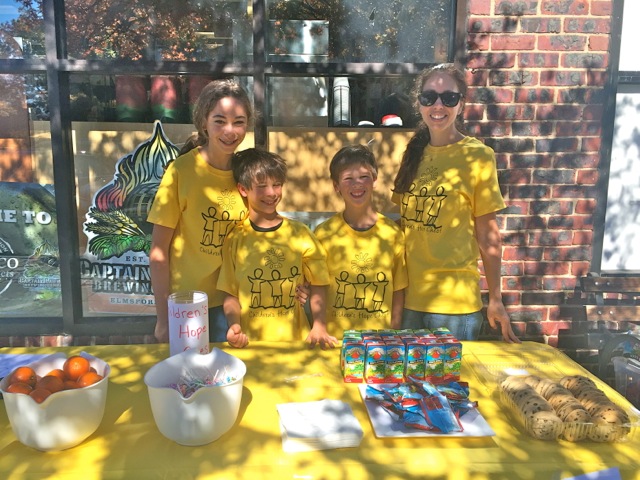 This weekend in Scarsdale we spotted Heather Solomon and her children in front of De Cicco's raising money for the 4th annual Recipe for Hope event for the Children's Hope Chest. They handed out snacks and raised awareness and funds for CHC.
This weekend in Scarsdale we spotted Heather Solomon and her children in front of De Cicco's raising money for the 4th annual Recipe for Hope event for the Children's Hope Chest. They handed out snacks and raised awareness and funds for CHC.
The Children's Hope Chest is a local organization that helps children in the community who are suffering from poverty, abuse, neglect and illness. This non-profit organization was started in 2005 and the grassroots mission is simple, for each volunteer or donor who "steps up to help the CHC, another child is helped."
Heather says, "It was an amazing opportunity for my kids to directly support children in their community who are in need of food, warm winter coats, backpacks, school supplies, and other daily necessities. It's a concept my school-age daughter and two sons could really relate to, and they took pride in their efforts to help other kids. Moreover, it was a great day to meet people in our community who were also eager to help others."
Many donators commented. One said, "This is a wonderful thing you're doing, keep up the good work." Heather's son (age 9) asked why people were complimenting them and she explained that they were performing an act of kindness and inspiring others. He looked at her, shook his head up and down a few times and simply said, "cool".
For more information about ways to support The Children's Hope Chest visit their website at www.childrenshopechest.com.
SHS Grad Travels the World to Make A Difference
- Details
- Written by Joanne Wallenstein
- Hits: 7657
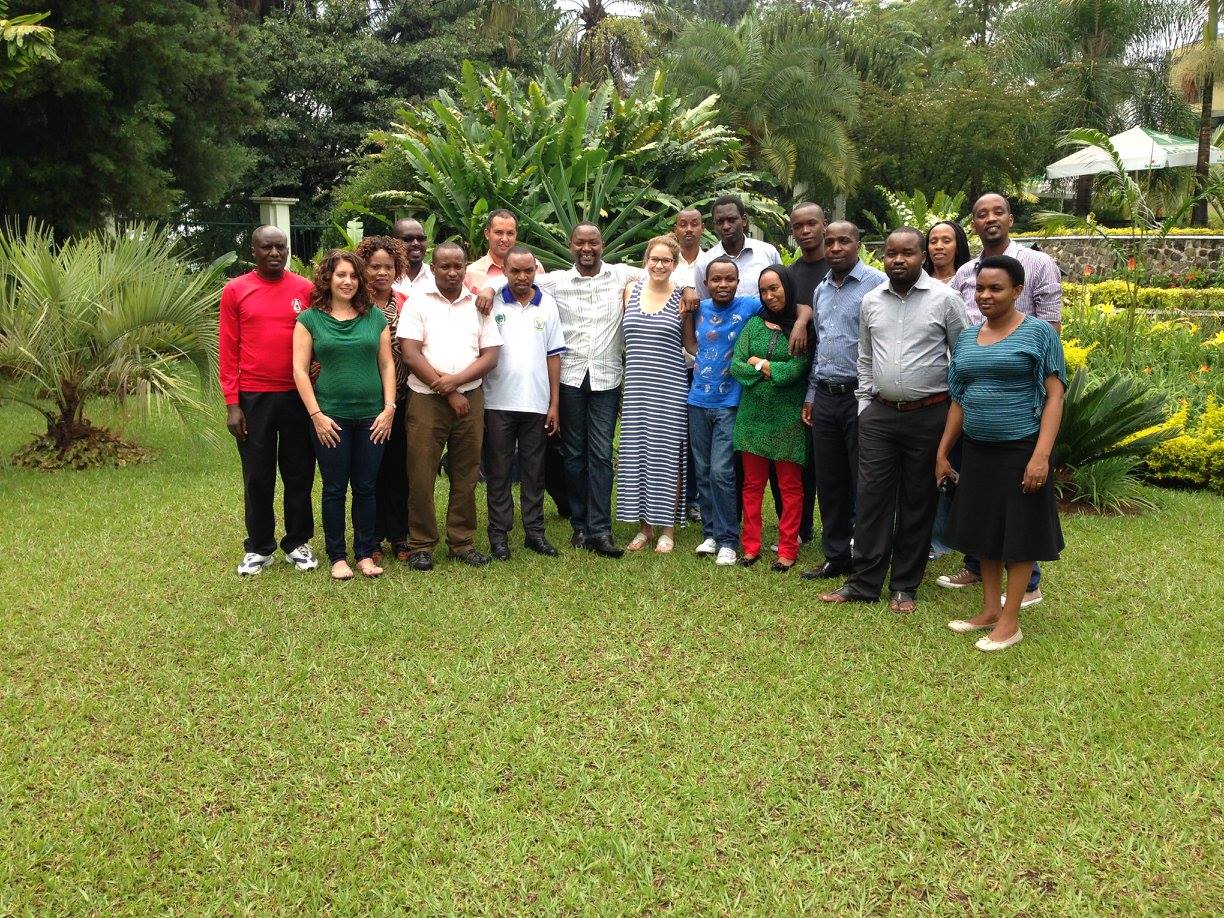 You never know where a Scarsdale education will take you. In just the past 12 months, Isabel Brodsky from the SHS Class of 2007 has traversed the globe and landed in hotspots like Rwanda, Ethiopia and Bangladesh where she works as an advisor to a company that implements government funded programs to improve lives in some of the world's poorest countries. How did she select this field and what has she learned? She outlines her journey here:
You never know where a Scarsdale education will take you. In just the past 12 months, Isabel Brodsky from the SHS Class of 2007 has traversed the globe and landed in hotspots like Rwanda, Ethiopia and Bangladesh where she works as an advisor to a company that implements government funded programs to improve lives in some of the world's poorest countries. How did she select this field and what has she learned? She outlines her journey here:
Tell us about your background. When did you graduate from high school, where did you go to college and graduate school --and what did you study? I graduated from Scarsdale High School in 2007. I went to Colgate University in Hamilton, NY where I majored in political science and minored in African Studies. I graduated from Colgate in 2011 and immediately went to get an M.A. from Fordham University in International Political Economy and Development with a concentration in International Development Studies. Since graduating from Fordham I have worked at Palladium in Washington DC.
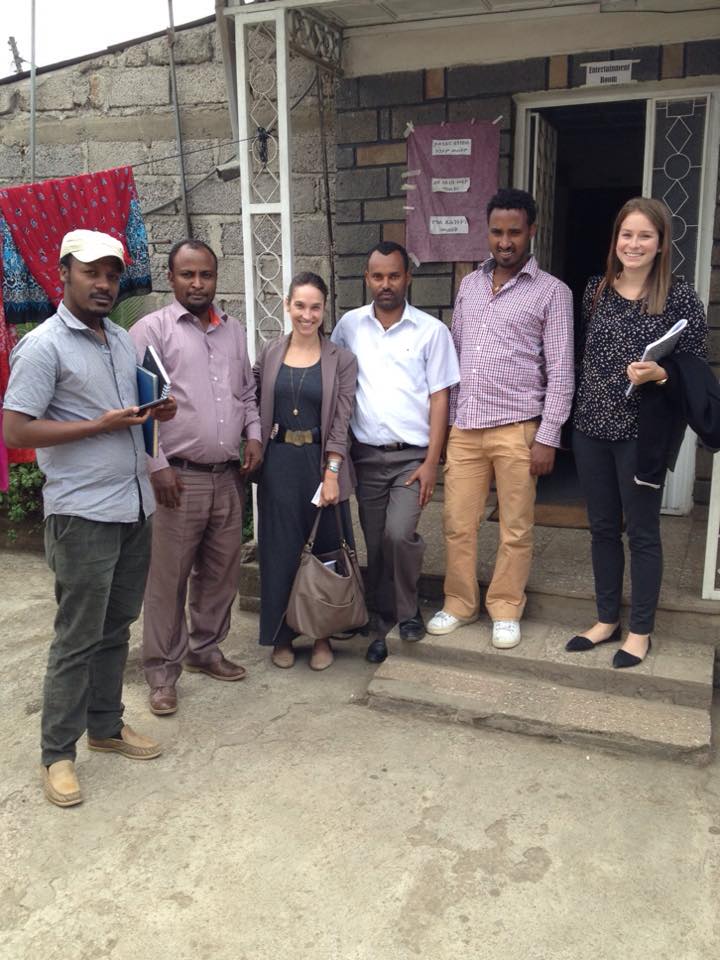 How did you become interested in the field? Who or what influenced you? I've always been interested in human rights issues, ever since middle school when we had a unit on human rights in my 7th grade history class with Ms. Wixted. In college my freshman year I took a class called Intro to Peace and Conflict Studies with a professor I really loved. She had worked in global health and I found her and the class to be really interesting. I think that is when I realized that I could work in this field as a career. I studied abroad in Dakar, Senegal during the summer between my sophomore and junior years of college and had an internship with two local NGOs and took classes on West African history and politics and Wolof (the local language of Senegal). That was my first experience going to a developing country and it motivated me to continue to pursue a career in global health and international development.
How did you become interested in the field? Who or what influenced you? I've always been interested in human rights issues, ever since middle school when we had a unit on human rights in my 7th grade history class with Ms. Wixted. In college my freshman year I took a class called Intro to Peace and Conflict Studies with a professor I really loved. She had worked in global health and I found her and the class to be really interesting. I think that is when I realized that I could work in this field as a career. I studied abroad in Dakar, Senegal during the summer between my sophomore and junior years of college and had an internship with two local NGOs and took classes on West African history and politics and Wolof (the local language of Senegal). That was my first experience going to a developing country and it motivated me to continue to pursue a career in global health and international development.
Explain the mission of Palladium and what you do there. Palladium is a consulting firm with a large focus on international development. Its mission is to deliver innovative solutions that create a positive impact and improve the quality of people's lives around the world. Most of Palladium's work is in the form of contracts with donor organizations such as USAID. I am a Data Use Advisor and work mainly on a USAID-funded project called MEASURE Evaluation, which helps to strengthen countries' health information systems. My work focuses on helping ministries of health, national AIDS programs, and other government entities to better collect, analyze, interpret, and use their health data to improve evidence-based decision making. Often times decisions are made arbitrarily without data to back them up. It's important to build the capacity of decision makers to use data to make decisions.
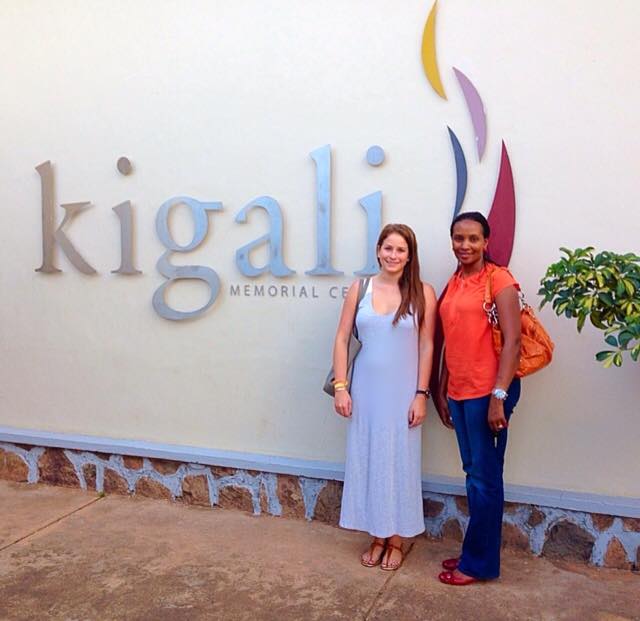 Where have you travelled in the last year? This year was crazy! I traveled to Rwanda twice, to Tanzania twice, to South Africa three times, to Ethiopia, and to Bangladesh. My next trip is going to be to Cote d'Ivoire next month, which will be exciting because I have never been there and I haven't been back to West Africa since I went to Senegal back in 2009.
Where have you travelled in the last year? This year was crazy! I traveled to Rwanda twice, to Tanzania twice, to South Africa three times, to Ethiopia, and to Bangladesh. My next trip is going to be to Cote d'Ivoire next month, which will be exciting because I have never been there and I haven't been back to West Africa since I went to Senegal back in 2009.
What do you do when you visit these countries? Many of the trips I do are to facilitate and participate in workshops or trainings. My most recent trip was in Tanzania, where we were pilot testing a one week curriculum that we developed on a software system called District Health Information Systems (DHIS2), which enables countries to collect all of their data electronically and manage, analyze, interpret, and visualize it within the software. We want to encourage people that using data is a critical part of their jobs, and also that there are user friendly tools out there to help them to do so. On many of the trips that I go on we also train people on GIS mapping software. Geographic targeting is becoming increasingly important, particularly in HIV, as the disease does not affect populations uniformly and funding is waning. Understanding where people are most affected by HIV can allow decision makers to be more targeted with where they allocate resources, plan programs, etc. We have been training staff on how to make maps of the distribution of HIV with software and also how to analyze these maps and use them in decision making and planning.
What are some of the things that surprised you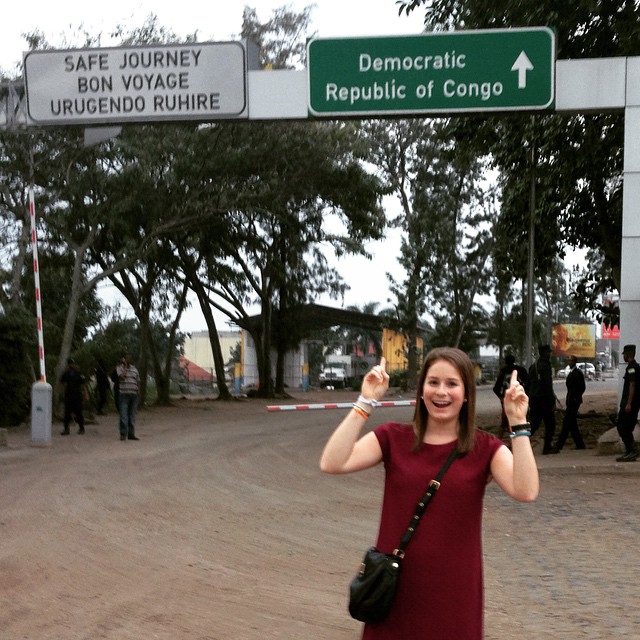 about visiting these countries? More than anything I'm just always struck by how beautiful all of the places I go to are and how nice and warm and friendly everyone is. I think that people have visions in their head for what they expect developing countries to be like, and some of them are true, but some of them are really off. I remember sending a picture to my family of Kigali (the capital of Rwanda) the first time I went there and they were so shocked by how beautiful it was. It shouldn't come as a surprise, but it often does.
about visiting these countries? More than anything I'm just always struck by how beautiful all of the places I go to are and how nice and warm and friendly everyone is. I think that people have visions in their head for what they expect developing countries to be like, and some of them are true, but some of them are really off. I remember sending a picture to my family of Kigali (the capital of Rwanda) the first time I went there and they were so shocked by how beautiful it was. It shouldn't come as a surprise, but it often does.
What are some common misconceptions Americans have about world health issues? That's a tough question. I think that people tend to focus on what's in the news and forget about world health issues quickly. For example, for months everyone was very focused on Ebola (rightly so) but also was misinformed about the disease and then quickly forgot about it. At the same time, there is little knowledge about many other pervasive health issues occurring around the world that don't get the same type of attention. Maybe if these issues were better known and understood there could be more support and funding for them.
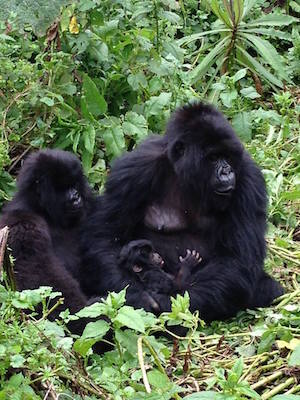 Can you tell us about any interesting experiences you have had while traveling? One of the most memorable experiences I've had was in the winter in Rwanda. There is a place in Rwanda called Volcanoes National Park, which is one of two places in the world where you can see mountain gorillas. I did a day trek in the park where you hike for hours through the rain forest with guides searching for the gorillas. Once you find them you have one hour to observe them in their natural habitat and then you have to leave. They do an amazing job with conservation and with ensuring that the gorillas don't get too used to being around humans. The best part of the entire experience was that one of the mother gorillas in the family had a newborn baby! It is definitely something I will never forget and probably never would have done otherwise.
Can you tell us about any interesting experiences you have had while traveling? One of the most memorable experiences I've had was in the winter in Rwanda. There is a place in Rwanda called Volcanoes National Park, which is one of two places in the world where you can see mountain gorillas. I did a day trek in the park where you hike for hours through the rain forest with guides searching for the gorillas. Once you find them you have one hour to observe them in their natural habitat and then you have to leave. They do an amazing job with conservation and with ensuring that the gorillas don't get too used to being around humans. The best part of the entire experience was that one of the mother gorillas in the family had a newborn baby! It is definitely something I will never forget and probably never would have done otherwise.
Is the work even more challenging because you are female? I think it is more challenging because I am young than because I am female. I think that it can at times be more difficult to be taken seriously because people may question by age and my knowledge and experience; however, I think I have also been able to use it to my advantage in difficult situations. Sometimes people are more willing to work with you and negotiate with you when they underestimate you or don't find you to be too intimidating.
Where do you see yourself going with this in the future? I hope to continue in this field and to ultimately develop an expertise in a disease area. One of my main interests that I hope to grow more professionally in is malaria and neglected tropical diseases. Ultimately I see myself becoming an expert in my field of choice and continuing to work with governments, people, and countries to improve health and livelihoods. Sometimes I think I will go back to school and get a PhD, but I'll just have to wait and see!
Any advice to students who may wish to pursue a similar career path? One of the most valuable things to have is field experience in a developing country. I suggest students seize opportunities to travel and work on the ground. It gives you a completely different perspective on this type of work and ultimately is very appealing to future employers. My other piece of advice is to find organizations that truly interest you and try to get a foot in the door at them however you can. I started off at my company in an administrative position and was able to advance to a more technical role. International development and global health are difficult fields to break into but once you do you will find a community of some of the smartest people you will ever meet and work with.
Varsity Raiders Off to a Strong Start
- Details
- Written by Joanne Wallenstein
- Hits: 6766
 Though the Scarsdale Girl's Varsity Tennis team may never again live up to the team's historic 117 match winning streak from 1990-2000, this year's group has spunk and stamina and is off to a strong start.
Though the Scarsdale Girl's Varsity Tennis team may never again live up to the team's historic 117 match winning streak from 1990-2000, this year's group has spunk and stamina and is off to a strong start.
Coach Jennifer Roane hinted that tennis may not be as popular in town as it once was – with about 40 players vying for 26 spots on the Varsity A and B teams this year, when previously the tryout would draw 60 hopefuls. Despite the numbers, the team of returning players and six newbies are posing a challenge to their opponents.
We stopped by to see Scarsdale meet Ursuline on a sunny warm September day and found the matches to be riveting. Junior Ashley Granieri is back playing first singles and on Thursday she played against her sometimes doubles partner Keira Tobia from Ursuline. The two battled it out from the baseline, hitting deep hard shots, alternating with drop shots to draw their opponents into the net. They played a lengthy match with Granieri winning the first set 6-0. In a second and also lengthy set, Tobia came out on top 3-6. This left the two to play a third set tie breaker which was great to watch. Granieri looked very pleased when she finally sealed the deal with a 10-6 win in the tiebreaker.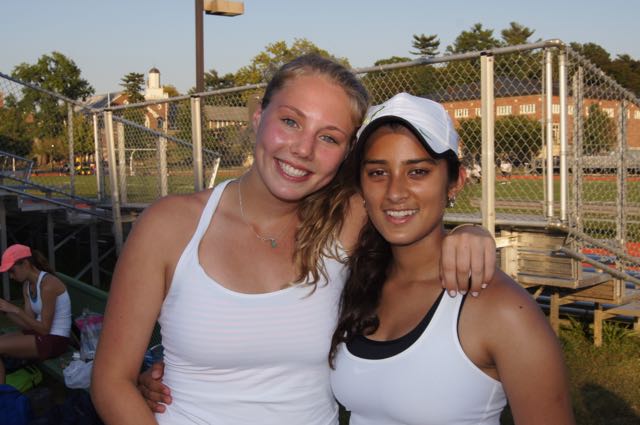
Discussing the match, Granieri explained that Tobia made more errors in the first set and hit more winners in the second. Ashley felt that she was able to win the tiebreaker because she was more consistent.
In second singles, senior Jessica Tsai also played a long match against ninth grader Laina Campos. Laina comes from a family of players and put up a great fight, despite being younger and smaller than Tsai. They had long deep exchanges in both sets with impressive backhand groundstrokes. When Jessica drew Laina to net with a drop shot, Laina hit beautiful down the line and cross court passing shots. It was nearly dark when Jessica narrowly won the match, 6-4, 7-5.
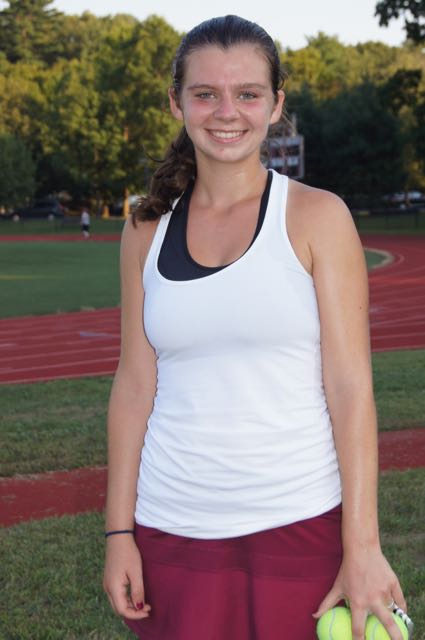 Tenth grader Phebe Denison is playing singles for the first time this year. She faced Ursuline freshman Vanessa Ciano who scored a decisive 6-0, 6-0 victory in the third singles spot.
Tenth grader Phebe Denison is playing singles for the first time this year. She faced Ursuline freshman Vanessa Ciano who scored a decisive 6-0, 6-0 victory in the third singles spot.
Playing first doubles, seniors Anshi Barmecha and Kayle Waterhouse looked like they were having fun. Anshi would set up her partner from the baseline and Kayle was great at covering the net and deftly putting away the balls. It wasn't an easy match – with Scarsdale winning the first set 6-3, Ursuline taking the second set 6-4 and the raiders coming out on top at 10-7 in the tiebreaker.
The second doubles match also ended in a tie breaker in Scarsdale's favor. Scarsdale junior Sam Leichtner was paired with sophomore Lily Steckel. The two lost the first set to Ursuline 6-2. In the second set the girls say they "got motivated and tried to end the points fast by coming to net." That worked and they came out 6-2 in the second set. The tiebreaker was tense with Scarsdale scoring an 11-9 win, in another closely-contested match.
The third doubles team of tenth grader Michele Getselevich and 9th grader Elizabeth Sinyavin are playing together for their first time this year. They lost 6-4, 6-2 to Ursuline and said their opponents had found their weaknesses and attributed the results to unforced errors.
The fourth doubles team of Haley Sontag and Natalie Breitkopf played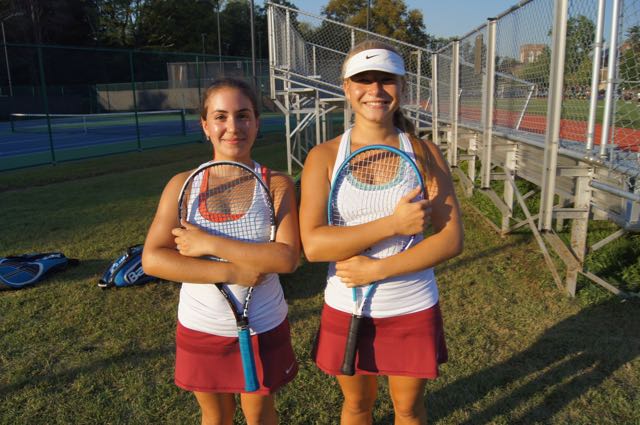 together for the first time against Ursuline and failed to win, but fortunately Scarsdale came away with a 4-3 victory.
together for the first time against Ursuline and failed to win, but fortunately Scarsdale came away with a 4-3 victory.
That was Scarsdale's third victory of the season – after a 4-3 win against Bronxville on September 8 and a 6-1 win over Clarkstown on September 9.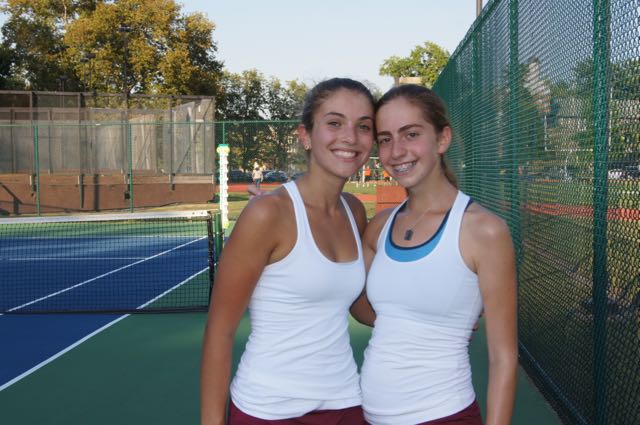
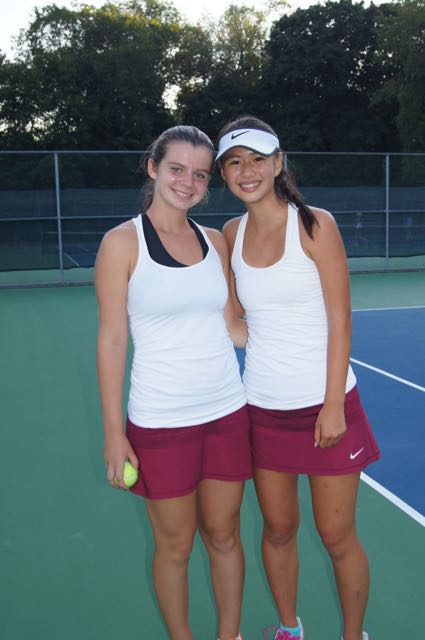
Scarsdale Sixth Grader Wins State BMX Championship
- Details
- Written by Joanne Wallenstein
- Hits: 5263
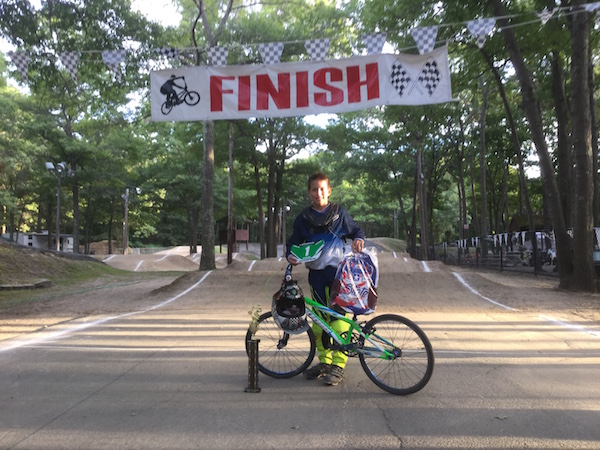 Eleven-year old Fox Meadow resident Andrew Greenspan, a sixth grader at SMS, won the championship main event in the intermediate BMX race in Shoreham this weekend. He also clinched the 2015 full season number one ranking and rein of champion the season for his division.
Eleven-year old Fox Meadow resident Andrew Greenspan, a sixth grader at SMS, won the championship main event in the intermediate BMX race in Shoreham this weekend. He also clinched the 2015 full season number one ranking and rein of champion the season for his division.
BMX (bicycle motocross) is a competitive bicycle sprint race on a dirt track with steep jumps and sharp turns. The sport is very family oriented and largely participant-driven, with riders ranging in age from 2 to 70, and over. BMX has three divisions: novice, intermediate, and expert . Professional ranks exist for both men and women, where the age ranges from 19 to 40 years old. BMX is a full medal Olympic sport.
In the main event Andrew tied for the lead at the end of the first straight away and then made his move into first and held that spot for the rest of the race. Andrew came into the race in second place in total points for the season - having won 3 state races and coming in third in another. It was perfect race weather at Shoreham BMX in Long Island for the season finale. Andrew began racing at the age of eight and will soon move up to the expert division. You may see him sporting his championship backpack at the middle school.
In Memoriam: Charles Hallac
- Details
- Written by Joanne Wallenstein
- Hits: 9541
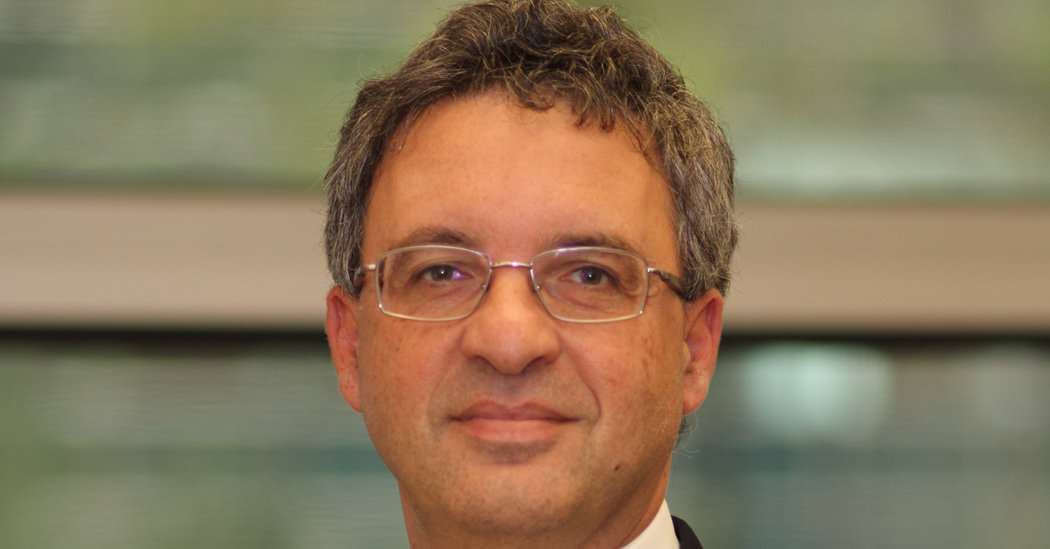 Scarsdale resident Charles Hallac passed away at the age of 50 on Wednesday September 9 after a four-year battle with cancer. He is survived by his wife Sarah, and three children, David, Rebecca and A.J.
Scarsdale resident Charles Hallac passed away at the age of 50 on Wednesday September 9 after a four-year battle with cancer. He is survived by his wife Sarah, and three children, David, Rebecca and A.J.
Hallac was Blackrock's first employee in 1988 and built the firm's investment platform, Alladin, which helped to propel the firm's growth and provided tools to improve investment and risk management. In 2009 he was named BlackRock's Chief Operating Officer and lead the integration of Barclay's global asset management business following its purchase by BlackRock. In 2014 he was promoted to Co-President.
According to a press release from Black Rock, "Hallac fought cancer for nearly four years with tremendous courage. He continued to work virtually every day while undergoing treatment, even returning to the office after receiving chemotherapy. Throughout his illness, he tirelessly pushed for continued evolution of the business to anticipate and respond to the rapid changes in technology."
Charles Shaul Hallac was born on Oct. 20, 1964, in Tel Aviv and moved to the Philippines as a toddler. He grew up in Manila and earned a B.S in economics and computer science from Brandies University in 1986. Before joining BlackRock he worked at First Boston.
The family asks that donations in his name be made to Memorial Sloan Kettering Cancer Center where almost $25,000 has already been raised in his memory.
The MSKCC website says, "After a courageous battle with cancer, Charlie Hallac passed away surrounded by his beloved family. Charlie's wife Sarah and his three children, David, Rebecca and AJ, were his inspiration, but he was also family to so many of us across BlackRock. BlackRock has lost a great leader, partner and friend. All of us will miss him greatly.
Over the past three and a half years, as he fought a terrible disease, it was easy to forget that Charlie was ill, because he never relented in his passion and energy to make BlackRock a better firm. Even as he received months of medical treatments, Charlie never complained. He was in the office virtually every morning, coffee in hand, ready for work--inspiring, mentoring and broadening our vision for what we could achieve.
BlackRock today is what it is in large part because of Charlie. He saw how to use technology to transform our industry in unique and powerful ways. But what enabled him to turn this vision into reality was his ability to lead people--to see their potential and develop it."













